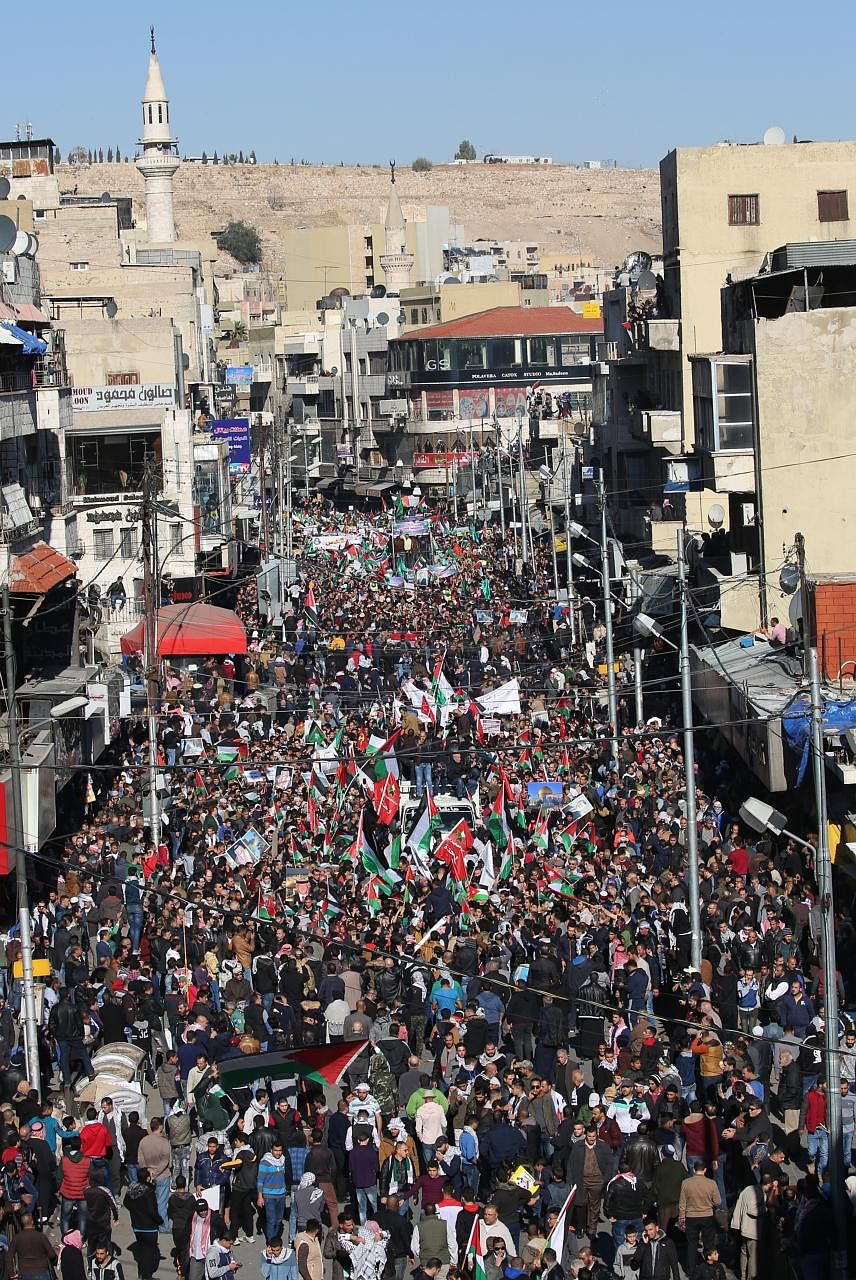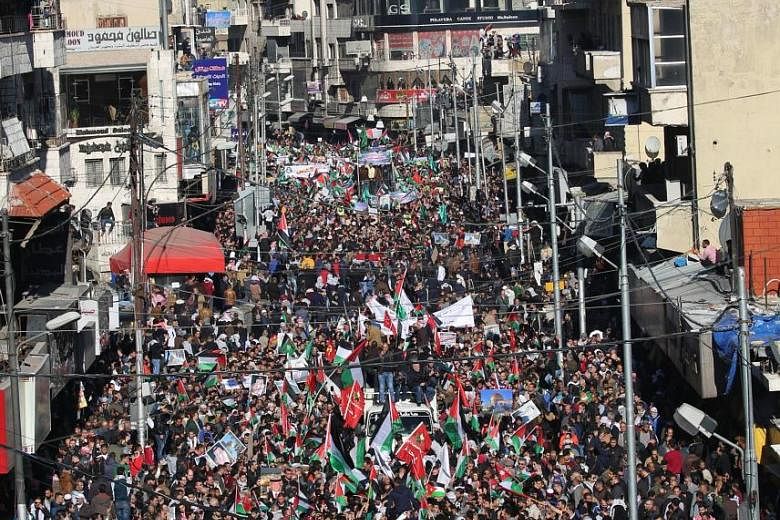Utterly trumped by ignorance
Donald MacIntyre
The Statesman, India
Perhaps appropriately, the first heavy rain after weeks of sunshine was splashing off the paving stones outside bookseller Imad Muna's news and stationery shop in Saladin, the busy main shopping street of Arab East Jerusalem.
Inside, the proprietor, his 27-year-old son Ahmad, and a 70-year-old customer, Mr Adnan Abdel Razeq, were holding a well-informed debate on the probable meaning of United States President Donald Trump's speech.
Mr Abdel Razeq pointed out that the United Nations Security Council had in 1980 roundly declared "null and void" the law passed by then Israeli Prime Minister Menachem Begin declaring Jerusalem the "complete and united" capital of Israel.
While agreeing with that, Mr Ahmad disputed another of the old man's points - namely that it would not be so bad if Mr Trump stressed he was specifying West Jerusalem as Israel's capital, which would have left open the possibility that East Jerusalem might still in future be that of the Palestinians.
It was a distinction the US President would not make.
Suggesting that Mr Trump might be attempting to provoke Hamas into breaking off reconciliation talks with its Fatah rivals, Mr Ahmad said: "Trump should not be talking about this at all. It is very dangerous. I'm sure there will be big demonstrations."
His father added that for the Palestinians an equal stake in Jerusalem was the "last bottom line". If Mr Trump was to challenge that, "that's it for the peace process".

Given the rhetoric raging among Arab leaders in advance of Mr Trump's speech, the trio in Occupied East Jerusalem sounded sober, even restrained.
But this seemed bred from a weary but steely determination not to let one more betrayal bully them into acceptance of that 50-year-old occupation.
From a rain-sodden Jerusalem, it was hard to figure out just what had possessed Mr Trump to unravel at a stroke the delicate Western consensus on the most inflammatory of all the issues between Israel and the Palestinians.
There was no doubt a complex of motives in the decision finally to move the US Embassy to Jerusalem.
But was one the influence of Mr Sheldon Adelson, Mr Trump's most lavish funder in the 2016 campaign, a zealous supporter of right-wing Israeli nationalism, and the original bankroller of Israel Hayom, the free newspaper which has been Israeli Prime Minister Benjamin Netanyahu's most unflinching cheerleader?
What is clear is that if this was an attempt for Mr Trump to reconcile his dream of the "ultimate deal" with the search for a campaign promise to fulfil, at whatever cost, the latter won.
Some of this must have gathered momentum in the apparently cordial dialogue - maintained, according to some diplomats, by WhatsApp - between two fabulously rich young men, Mr Trump's son-in-law Jared Kushner and Saudi Arabia's Crown Prince Mohammed bin Salman.
It appears that this may have given birth to the idea - first reported in The New York Times - of an emerging Trump-planned "peace" deal.
This would, among other things, have offered the Palestinians a capital away from the heart of East Jerusalem proper, in the suburb of Abu Dis. "This was first mentioned after Oslo accords (in the early 1990s)," Mr Abdel Razeq said of the reports, "and we laughed about it then."
If Crown Prince Mohammed really thought - and it has not of course been confirmed - that he could ignore the Palestinians' "last bottom line", then he may have seriously underestimated the extent of the place Jerusalem holds in the hearts of not only Palestinians - but those throughout the Muslim world, including his own country.
That may well be why the King of Saudi Arabia has appeared to reject the formula allegedly thrashed out with Mr Kushner, instead reinforcing the long-held Arab peace initiative under which Israel would be recognised throughout the Arab world in return for a Palestinian state in Gaza, the West Bank and East Jerusalem, and based on June 1967 borders.
It's hardly a secret that Saudi Arabia and Israel are seeking to nurture an alliance to challenge their common opponent, Iran. Perhaps some in the kingdom were prepared to forsake the Palestinians in pursuit of that cause. But Jerusalem is at the heart of why they dare not do that.
One of the wisest Israelis in Jerusalem is Daniel Seidemann, the man who has advised successive US and other foreign governments on the hugely delicate issues the city presents for any peace process.
He warned ahead of Mr Trump's announcement that it could spell the end of the US' role as a peace broker. "Jerusalem is a kind and dignified place if it's treated with respect," he told me. "But those who ignore its complexities find it comes back to bite their sensitive parts."
Stab in the heart
Editorial
The Nation, Thailand
The United States leader Donald Trump risks disqualifying his country from playing a future meaningful role in the Israel-Palestine peace process, after he announced that the US would move its embassy in Israel from Tel Aviv to Jerusalem and officially recognise this ancient city as the capital of the Jewish state.
Mr Trump reasoned that American presidents before him signed waiver after waiver delaying the relocation of the embassy to Jerusalem, thinking it would obstruct any peace initiative between the Israelis and Palestinians. But, "after more than two decades of waivers, we are no closer to a lasting peace agreement between Israel and the Palestinians. It would be folly to assume that repeating the exact same formula would now produce a different or better result", he said.
Mr Trump's America has once again broken ranks with international consensus that Jerusalem's status should be decided in a final peace agreement between Israel and Palestine.
The decision to make Jerusalem the capital of Israel is not Mr Trump's to make.
The act itself did not kill the peace process. It was Mr Trump's way of telling the world that his administration thinks it's dead anyway. And in his mind, there is no reason to try to bring a dead horse to life.
But this does not mean Mr Trump's decision to relocate the embassy did not come with a price. Trump's move was a stab in the heart for the Arabs.
It could have been one of those "if you don't mind, then it doesn't matter" situations. But in this case, the Palestinians mind and they do mind greatly.
Trump's short-sightedness
Odo Manuhutu
The Jakarta Post, Indonesia
The space of foreign policy offers leaders an opportunity to demonstrate their agility in balancing between responding to domestic imperatives and ensuring a state's survival in the continuous sea of change.
The foreign policy guru, former United States secretary of state Henry Kissinger, cautioned policymakers against the perils of allowing excessive domestic politics to trump foreign policy objectives. Critics denounced his views as cold-blooded foreign policy that disregarded human rights, and led to bloodshed and power struggles in places like in Chile and Iran. Yet, his views are still as pertinent as ever.
President Donald Trump's decision on the status of Jerusalem is a case of how domestic politics, fuelled by identity politics, has dangerous ramifications.
His policy reignited simmering tensions surrounding the two-state solution of Israel and Palestine and intensifies the debate on how far domestic politics should play a role in foreign policy.
One can argue that foreign policy is an extension of domestic politics. Others would argue that foreign policy practitioners are obliged to shield nations from falling into short-term traps.
Countries can ill afford having a short-sighted or low-hanging fruit foreign policy. Kaiser Wilhelm II's impetuous foreign policy of the German empire fuelled World War I and led to the fairly rapid disappearance of ancient empires.
Then US President Richard Nixon's policy of opening up to China would have been rejected by domestic audiences if Americans had known about it from the very start. The same is true with the process that led to the Oslo peace process for Israel and Palestine.
Well-thought-out foreign policy coupled with effective diplomatic machinery pay dividends in the long run.
Disruptor of world order
Wen Zongduo
China Daily, China
In depriving the freedom of travel of Muslims from certain countries recently, the US has alienated itself and, instead of being the melting pot of the world, is well on the way to inciting conflicts with the Muslim world.
The United States is now casting itself as a disruptor of the world order and the peace it has maintained so far by jolting the very foundation of peace surrounding Jerusalem.
In typical Donald Trump style, he announced this major foreign-policy initiative in a tweet: "I am also directing the State Department to begin preparation to move the American Embassy from Tel Aviv to Jerusalem."
The social media star succeeds again in winning eyeballs by boldly "delivering" his campaign promise and consolidating his support among pro-Israel political constituencies and mega military-industrial complexes.
But his "recognition of reality" is only half true because the 1995 Jerusalem Embassy Act that calls for moving the US Embassy to Jerusalem pitches Israel against Palestine.
Unlike what Trump backers said - "Jerusalem has been, and always will be, the eternal, undivided capital of the state of Israel" - Jerusalem itself remains divided and contested by Israel and Palestine which both want to declare it as their capital city.
Since that controversy itself lies at the heart of Middle East conflicts, the hollowness of Mr Trump's words was immediately exposed when he added that "we are not taking a position of any final status issues, including the specific boundaries of the Israeli sovereignty in Jerusalem or the resolution of contested borders".
His action takes sides even as his words said otherwise.
It is great for Mr Trump to try and Make America Great Again, but not by sacrificing the interests of the international community.
- The View From Asia is a compilation of articles from The Straits Times' media partner, Asia News Network, a grouping of 23 news media entities.

